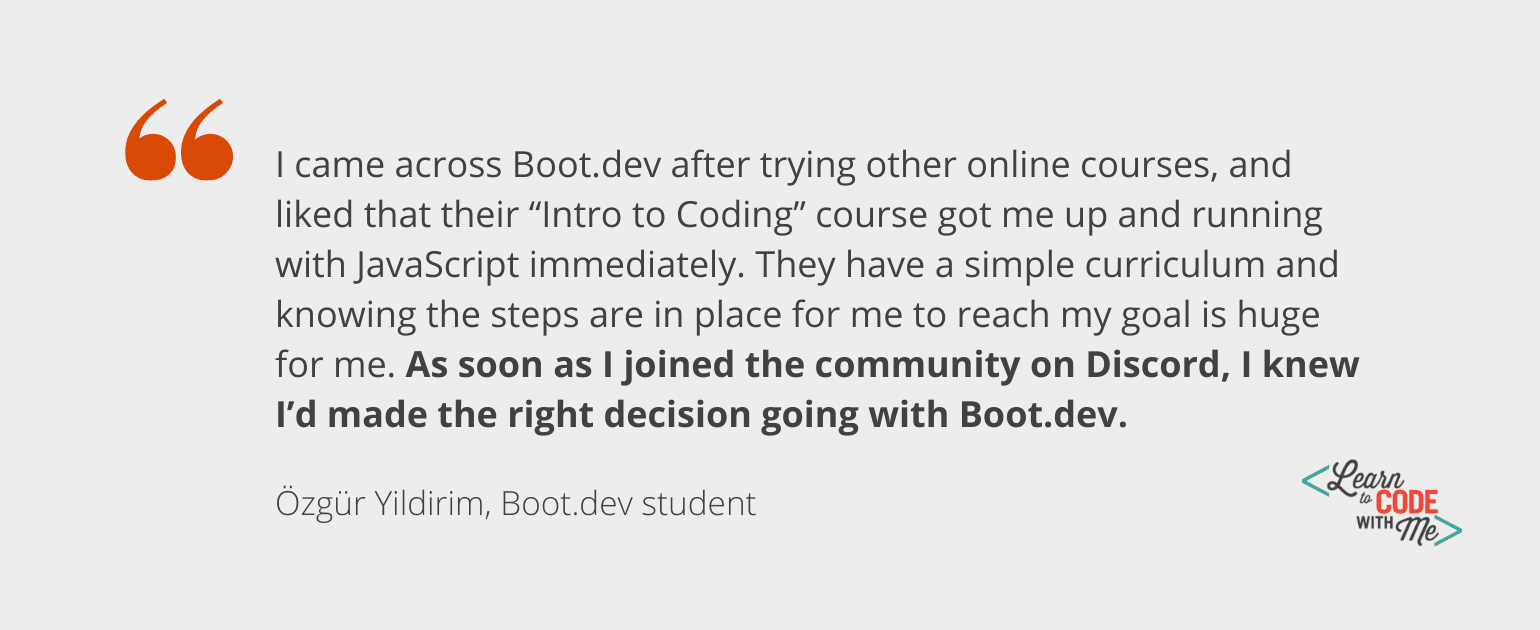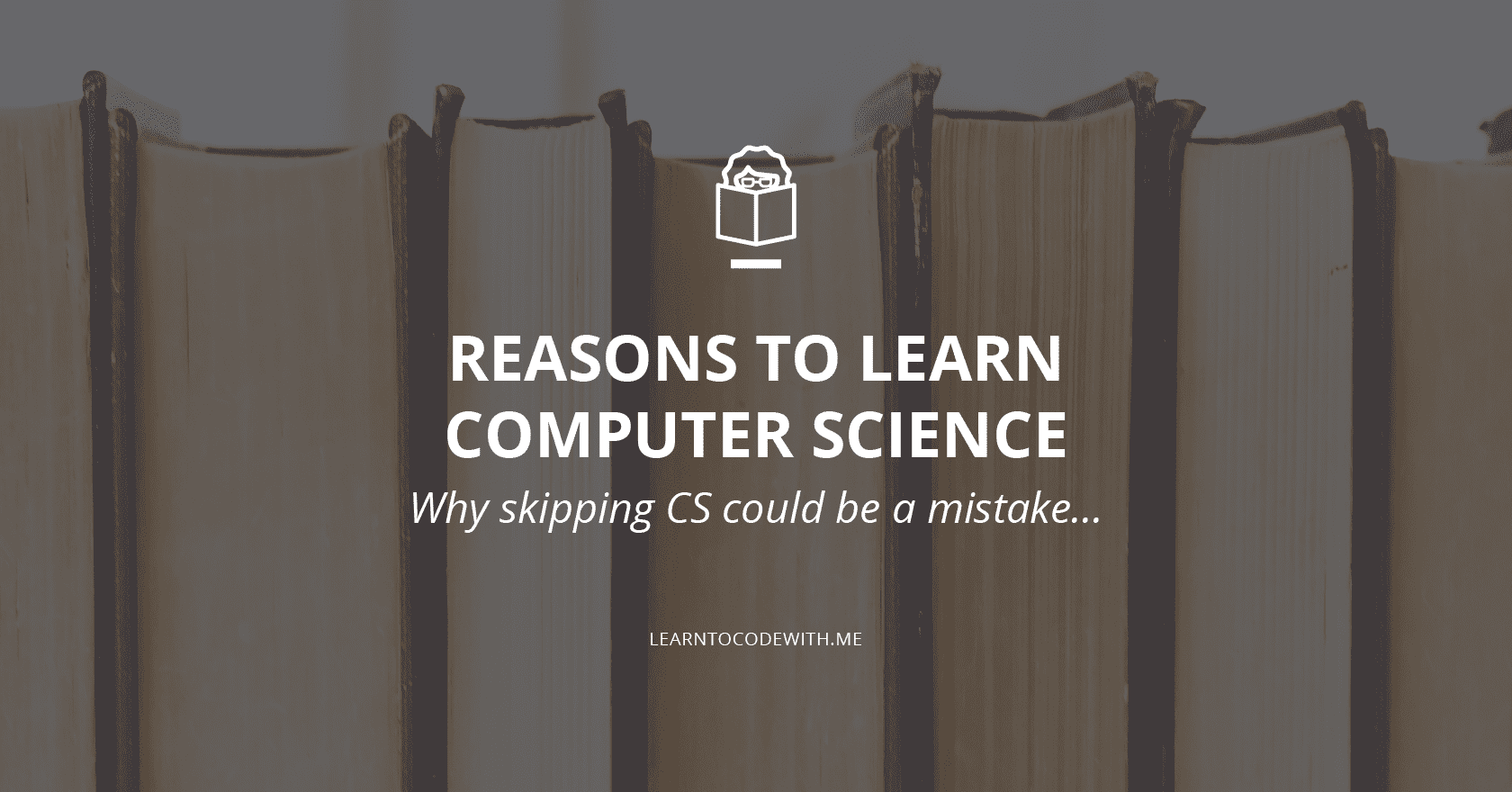When we decide to learn tech skills, most of us jump right into learning a coding language—often HTML, CSS, or JavaScript.
Most online education, bootcamps, and other methods of self-guided education tend to follow the same trend: they focus on teaching you specific programming languages and technologies. You don’t see so much about learning computer science skills.
By contrast, you will usually spend time learning about computer science topics if you pursue any kind of tech degree from a university.
➡️ So that brings us to the question: is computer science worth it? If you’re excited to dive right into coding languages that will let you build things right away, learning computer science may seem a bit boring and not immediately practical. 😴
But not having even basic knowledge of computer science could be a big mistake as you start your tech journey!
In this sponsored post with Boot.dev, its founder Lane Wagner joins us to help answer: why is computer science important?
We’ll start by covering a few differences between computer science vs computer programming (because computer science is not programming!). Then, we’ll outline seven reasons why computer science skills deserve to be part of your learning plan as a beginner in tech.
Computer Science vs Coding: What’s the Difference? 🤔
Is programming computer science, or related to it? Is computer science just coding? These terms are often used in similar contexts, so let’s start by defining programming vs coding vs computer science.
➡️ Programming is the practice of creating a solution to a problem using software. It’s working out which decisions a computer needs to make and telling it under which conditions it should make those decisions.
➡️ Coding is the process of translating what’s in your head into instructions a computer can understand and execute, i.e. code. When it comes to coding languages, “coding” and “programming” are often used synonymously.
➡️ Computer science is the study of what computers can do. It’s a mathematical science about solving problems using technical solutions/algorithms.
Whereas coding and programming are about making computers do what you want, computer science is about how computers do that—what actually happens inside the computer when you run your code.
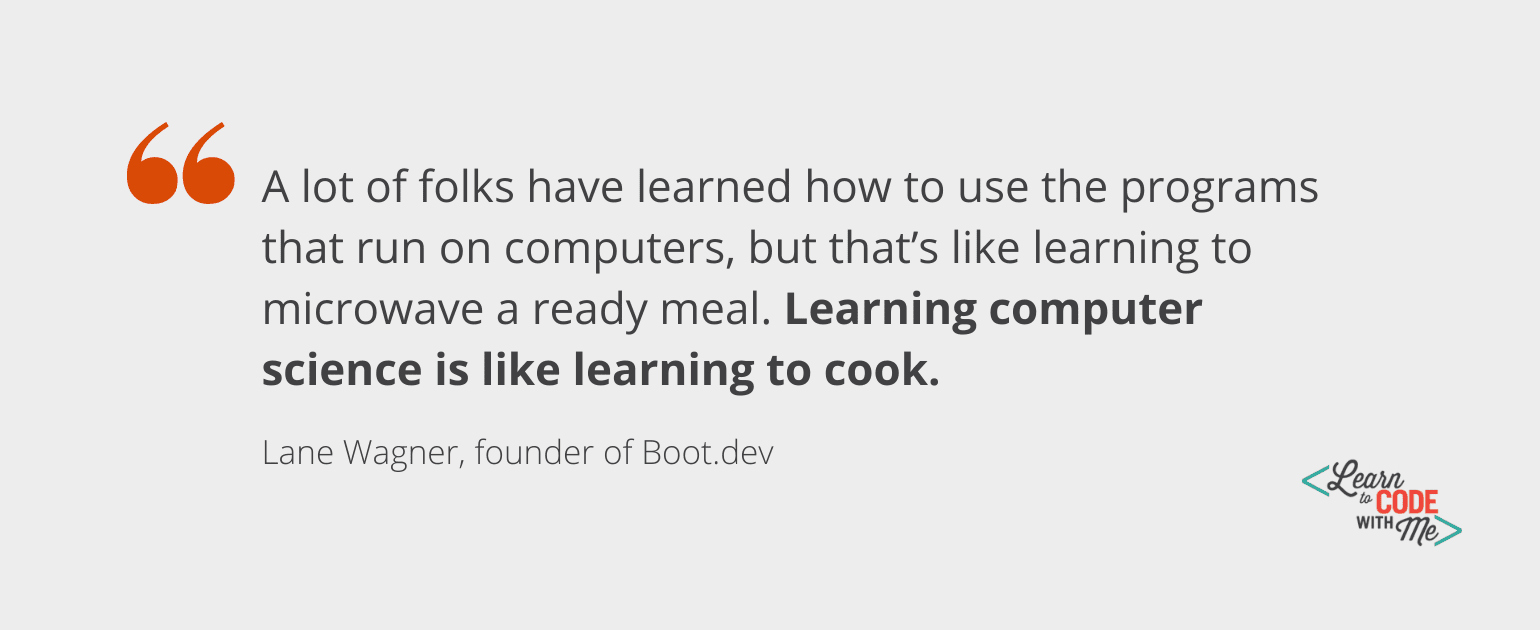
☝️ Back to top
Why Learn Computer Science (vs Coding Alone)? 7 Reasons to Learn CS Basics
Now, let’s turn to why computer science topics might be beneficial for you to learn before (or while) you learn to code.
The main reason starts with your motivations. Anyone can learn to code. In just a few minutes, a complete newbie could follow along with an online coding tutorial and start typing out their own HTML, for example. For hobbyists and experimenters, an understanding of CS principles isn’t necessary.
But if you want a career in tech, or you want to be a programmer, you will really benefit from learning about computer science first.
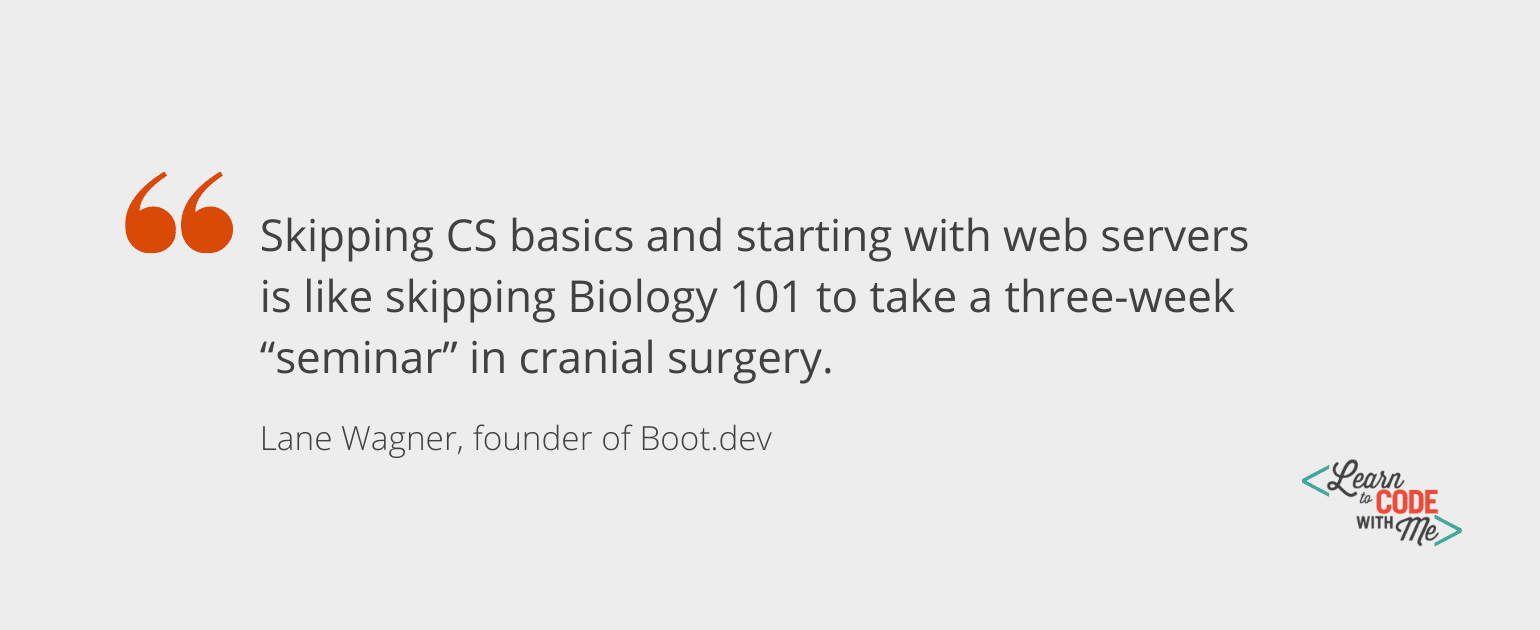
Here are seven reasons why computer science skills are helpful to aspiring tech professionals!
1. You’ll learn faster ⏱️
Once you know CS basics, you have a proper understanding of what computers can and can’t do, their limitations, how they work, etc. You’ll also already be familiar with a lot of technical terminology, structures, etc.
When it’s time to learn a specific programming language, you’ll already have the underlying knowledge/language to understand what you’re learning. You’ll still need to master the specific syntax of the code, but you already have the outline provided by basic knowledge of computer science.
Having this foundation of CS knowledge ultimately makes learning programming languages easier and quicker.
Start coding now
Stop waiting and start learning! Get my 10 tips on teaching yourself how to code.
☝️ Back to top
2. You’ll write better, more efficient code 💻
There are a lot of layers underneath code: algorithms, data structures, computer networks, hardware, software, compilers, and operating systems.
If you don’t understand how these work, your coding abilities are going to be more basic and limited. You’ll be going through the motions without really understanding why.
But if you understand how computers work, how they understand your code, etc. you’ll be better able to write code that solves problems efficiently and creatively.
👨🏽🍳 Cooking is a great analogy for this. You can cook a meal by following a recipe, but you’ll probably get better results if you actually understand how flavor, texture, etc. work. And once you gain this underlying knowledge, you’ll be able to write your own recipes and become a more creative chef!
☝️ Back to top
3. It’ll help you find out which aspect(s) of tech you like most 💙
When you learn about the foundational concepts underlying programming languages, etc., you learn about all different aspects of tech.
All modern career paths in tech are based on computer science’s subfields, such as software engineering, network engineering, cloud computing, mobile computing, embedded systems design, database design, etc.

If you learn the fundamentals of all of these subfields, finding what you’re passionate about will be much easier. You don’t have to master computer science for this; even learning the basics gives you a whole smorgasbord of knowledge and options.
This is amazing for beginners who aren’t sure which direction to go in yet. Learning CS can help you get a sense of which area you’d like to specialize in (security, engineering, machine learning, etc).
Front end skills checklist
Download a free checklist that will walk you through all the skills you need to become a front-end developer.
☝️ Back to top
4. Your CS knowledge will always be relevant and useful 🔮
Programming languages, frameworks, tools, etc. go through changes and updates all the time. As tech evolves, so do the tools: they change or grow obsolete, and new ones take their place.
There have been hundreds of programming languages since the invention of the computer. The TIOBE Programming Community index started tracking just 25 languages back in 2001 and now measures more than 150 languages once a month!
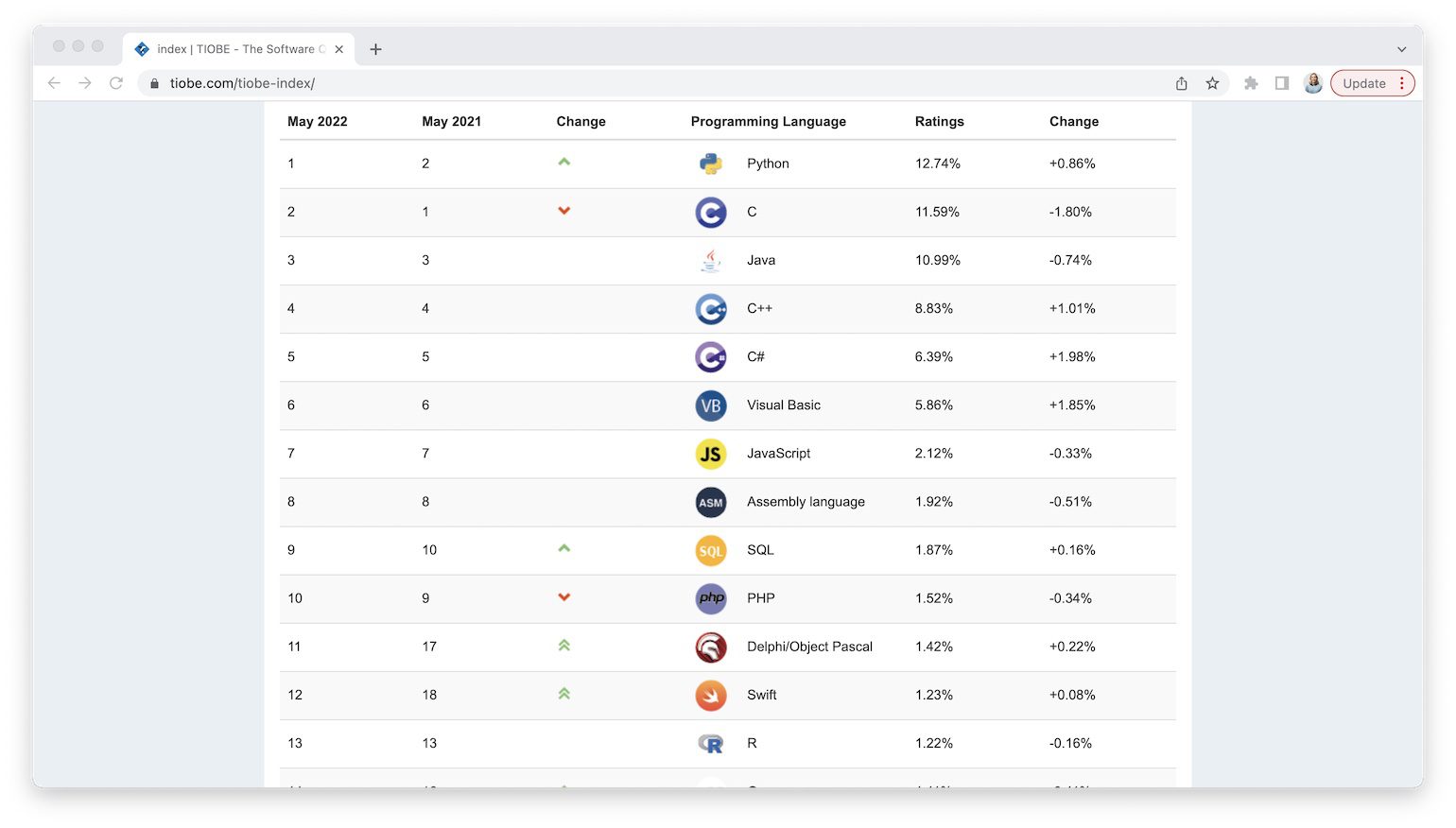
And those are just the most common languages—HOPL counts 8,945 programming languages in total.
If you were around when older technologies like Flash and Dreamweaver were big, then you know how even widely used tech can change and disappear.
Objective C, developed in 1983, was the primary language used by Apple for both iOS and macOS for a long time. It led to the development of Swift, which Apple then replaced it with.
➡️ Moral of the story: your skills are only useful for so long before you need to update or replace them. But the beauty of computer science is that it provides the same, consistent foundation to build those skills on.
As Lane says, “The really fascinating thing about computer science is that the fundamentals rarely change because it’s basically just an extension of math. It’s one of the few disciplines that will give you a foothold in whatever the future brings. Why learn computer science? Because one set of skills will see you through your entire career.”
Computer science concepts and engineering best practices rarely change. Popular languages and frameworks come and go. Learning the former will help you adjust more rapidly to the changes in the latter.
☝️ Back to top
5. It’ll be easier to get a job 👔
These days, anyone can learn to code, quickly, cheaply or even for free, from home. And that’s one of the things I love about coding: it’s accessible to everyone! However, it also means that since the barrier to entry is lower than ever, there are more people out there with coding/programming skills.
As learning to code becomes easier, differentiating yourself becomes harder. But if you have an understanding of CS, you’ll have an advantage over everyone who doesn’t. Learning computer science vs coding skills alone helps you stand out in the sea of applicants.
Lane has seen this unfold firsthand. “We’ve recently had an influx of thousands of self-taught developers or Bootcamp grads that are all looking for entry-level jobs, but don’t have the fundamental math and CS skills to solve more technically challenging problems,” he says. “By having a deeper understanding of computational theory and algorithms, you can set yourself apart to land jobs faster and command a higher salary when you get there.”
Coding bootcamps and courses are great, but they may not always be enough—especially if you’re brand-new to tech and don’t have connections. You need someone to give you that first chance!
Lane advises, “In my experience, it’s much easier to get your foot in the door when you spend the time learning the CS basics that so many ‘crash courses’ skip over when trying to get students to dive directly into the deep end of application code.”
☝️ Back to top
6. You’ll be able to progress further in your career 💰
Having a foundational understanding of CS principles opens up your options in terms of progression. Even basic knowledge of computer science concepts gives you more of a platform to build on.
Once your foot is in the door, even at an entry level, learning computer science allows you to keep advancing. Your chances of getting promoted, commanding a higher salary, etc. will be better.

“If you never take the time to learn CS basics, it’s unlikely you will ever make it as a senior developer,” Lane says. “Advancing to ‘senior’ status can happen surprisingly fast if you have a strong grasp of fundamentals. It makes me sad to see developers with 8 years of experience in JavaScript and React who are unable to think through performance and scalability problems.”
Once you know what’s going on behind the scenes, you’ll be able to perform different, more advanced kinds of jobs than someone who’s just going through the motions.
☝️ Back to top
7. It’ll be easier to learn new languages & technologies in the future 🤓
When you know the fundamental concepts about how computers work, you can pick up pretty much any specific language without too much difficulty.
“Learn how to think like a developer and the technologies will just make sense,” Lane says.
Think about it like learning languages. Once you’ve learned one foreign language and you understand some foundational knowledge about verb conjugation, tenses, parts of speech, etc., it’s much easier to pick up a second foreign language because you already understand the concepts you’ll need to learn.
“As new frameworks, languages, and technologies are developed, having a solid grounding in computer science will give you opportunities in a quickly-growing field,” Lane says. “Look at blockchain and web3—that’s just one potential direction computer science can take you. I couldn’t possibly predict what groundbreaking new development will come next, but I know computer scientists will be at the forefront of it.”
Want to get better with HTML?
Download my free HTML5 cheat sheet below.
☝️ Back to top
What Computer Science Skills Do You Need to Learn?
Exactly which computer science topics you should study depends on what direction you want to take with them. You don’t have to have an exact path nailed down, but it does help to know if you’d rather target front-end or back-end skills.
Here’s what Lane recommends:
⚙️ CS skills for backend engineers: “Definitely data structures and algorithms. You need to understand how the data you’re storing in your system needs to be stored in order to scale your app.”
🖥️ CS skills for front-end engineers: “I think algorithms are still important, but concepts like OOP and functional programming are going to be even more critical in the short term.”
Lane has summarized his take on the essential and optional computer science skills in these tables:
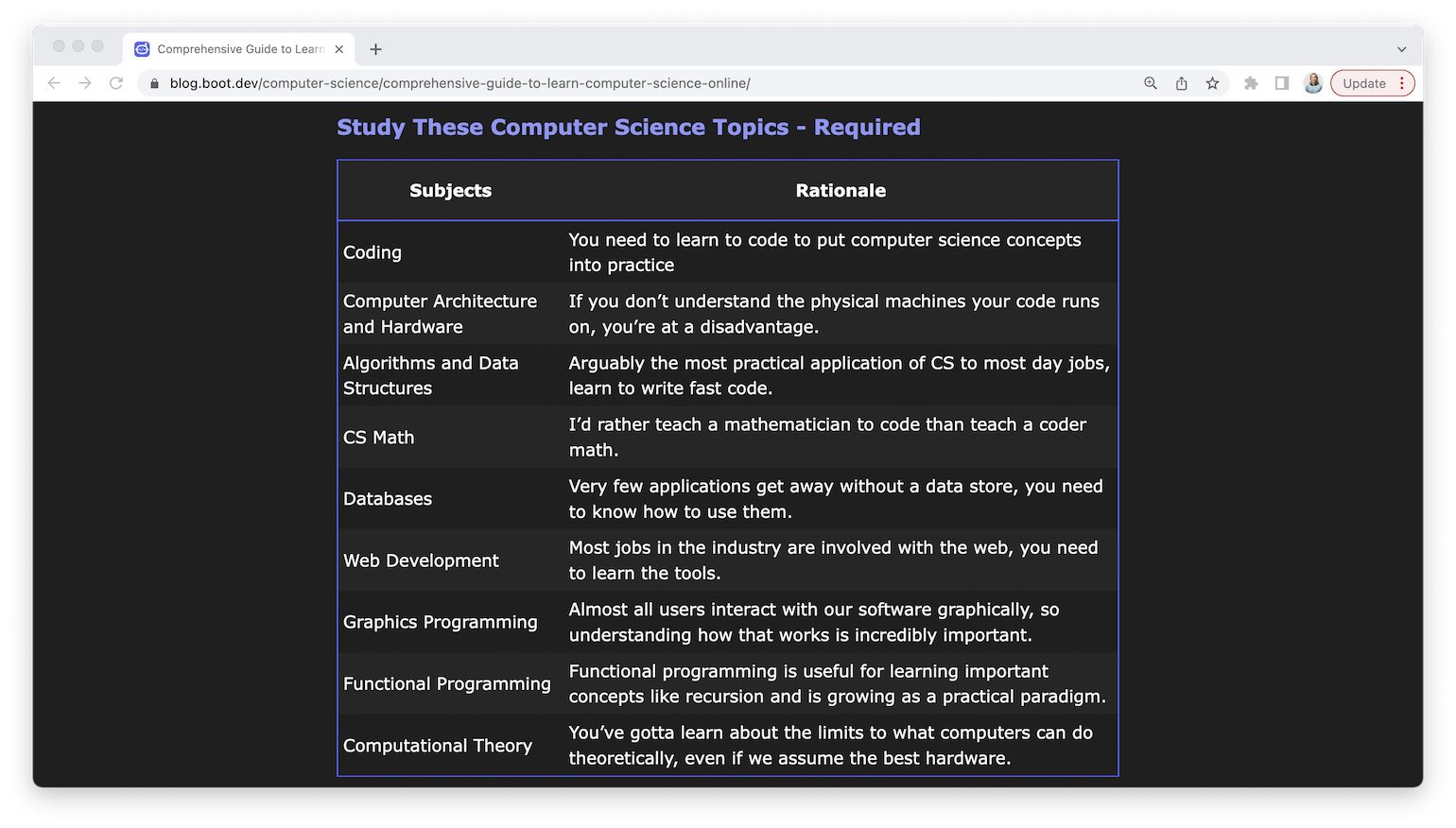
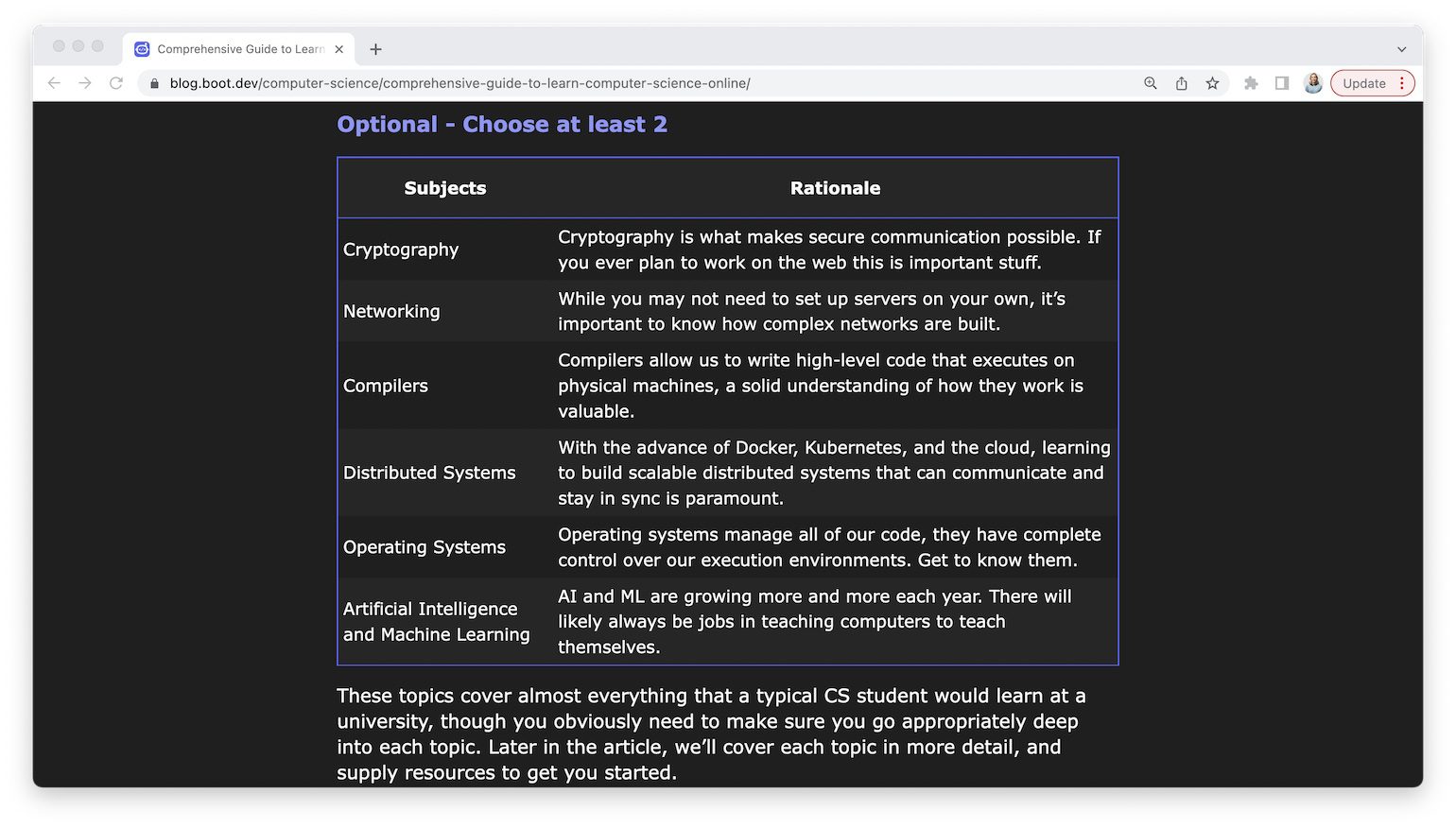
He recommends learning a single technology you want to work with in your first job, e.g. Django, and going deep on CS fundamentals.
If you follow Lane’s advice, you’ll likely be able to learn the equivalent of a CS major in less than two years, and should be able to get an internship or a first job after just 3-6 months, depending on how much time you’re able to practice and study daily.
“Let me be clear, I’m not saying you need to have the equivalent of a CS degree before you start looking for jobs,” Lane says. “But every engineer will have a more successful career if they understand CS fundamentals.”
☝️ Back to top
Why Learn Computer Science with Boot.dev?
Lane built Boot.dev based on the lessons he’s been learning as an engineering hiring manager. Notably, he says, “I’ve learned that entry-level developers don’t learn enough computer science, and that is the biggest obstacle on their way to a successful coding career.”
That’s why unlike many other platforms, Boot.dev focuses on teaching you computer science, not just tools, frameworks, and technologies. The platform doesn’t choose between computer science vs computer programming content, but weaves them together.
“At Boot.dev, we don’t focus on the latest hyped-up framework,” Lane says. “We teach evergreen skills that will serve you well through your entire career in software engineering.”
Currently, the platform features a variety of courses in Python, Golang, and JavaScript, with more languages coming in the future. Each course emphasizes CS principles and helps you apply them through hands-on projects and coding exercises.
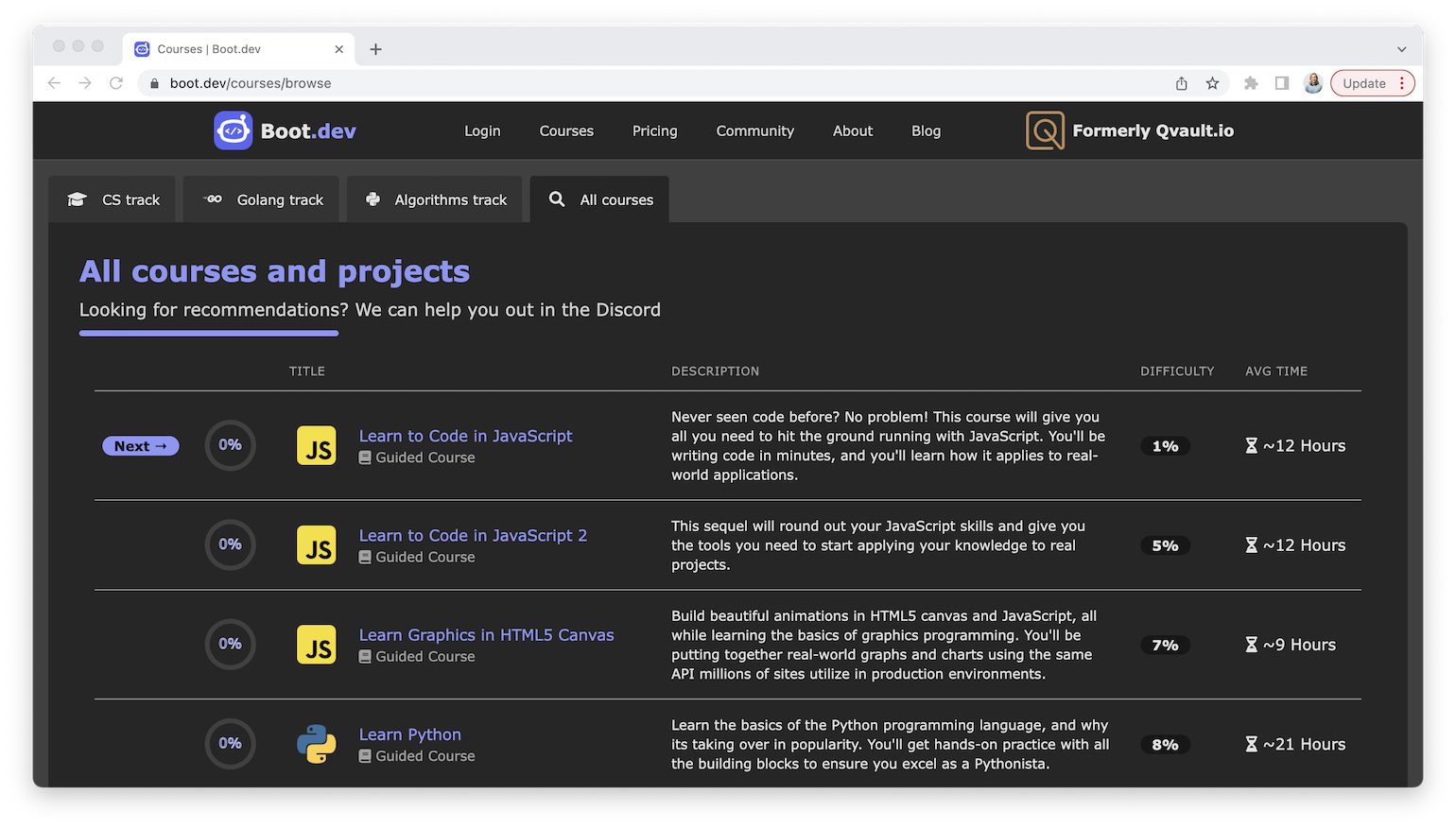
Boot.dev membership also comes with lots of built-in social support: a Discord community, weekly coding workshops, resume review sessions, etc. Learning is so much easier (and more fun) when you aren’t alone.
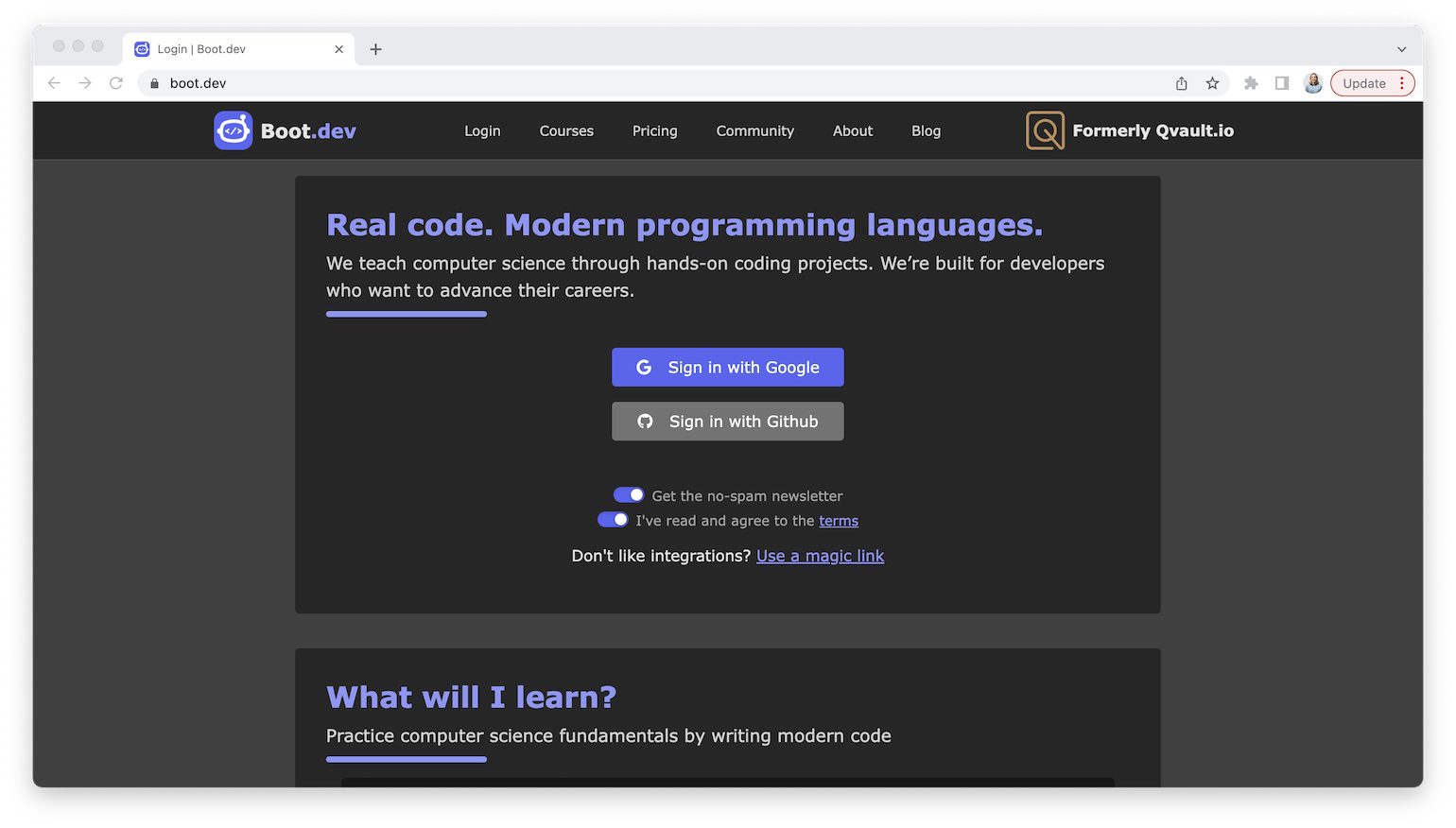
So if you’re serious about a career in tech and want to stand out from the crowd by learning CS, join the 12,000+ developers learning on Boot.dev.
At the time of writing, they have several pricing options available:
- Monthly plan: $29/month
- Annual plan: $192/year (averages to $16/month)
- Lifetime plan: one-time payment of $349
🔔 Lane is offering LTCWM readers 10% off with the code LEARNTOCODEWITHME.
Check out all of their courses and tracks here, or head to the homepage to sign up for Boot.dev and explore why computer science skills are a great thing to have in your arsenal!
